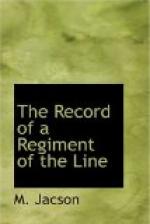The journey to Pietermaritzburg was in the nature of a triumphal procession, for at various points along the line small knots of old men women and children, waving Union Jacks, cheered the troops most lustily as the trains passed.
A remark frequently heard was “How glad they are to see us,” and it was evident that these people at least, who were interested and possessed homes in Natal, had not underrated the power and intentions of the Transvaal. The Regiment had an enthusiastic reception, as indeed did all troops passing to the front, flags and handkerchiefs being waved from every house farm and village. At some stations where a short stop was made to allow of other trains getting on ahead, tea and refreshments were given out free, by willing hands, to the soldiers in the trucks.
Trains were running with about 500 to 600 yards distance between them.
On October 6th between 7 and 8 a.m. the trains conveying the Regiment reached Pietermaritzburg, and here the men had breakfast. Pushing on again with as little delay as possible and passing Estcourt at about 3 p.m., and Colenso about 4 p.m., Ladysmith was reached at 6 p.m.
Detraining took place at once, and the Regiment marched off to Tin Town, about two miles distant, where camp was pitched in the dark.
The infantry at this time in Ladysmith consisted of:—
The Gordon Highlanders.
The Devonshire Regiment.
The Gloucester Regiment.
The Liverpool Regiment.
Rumours of war and warlike preparation on the part of the Boers were continually being circulated, and at daybreak on October 11th the Transvaal Boers crossed the frontier of Natal 18,000 strong with fourteen guns.
On October 12th, at 2 p.m., orders were received for the Regiment to prepare at once to go out as part of a flying column towards Acton Holmes to check the advance of the Free State Boers, who were reported to be crossing the Biggarsberg by Vanreenen’s Pass; and at 2 a.m. a force consisting of four regiments of cavalry, four batteries R.A., and three regiments of infantry (Liverpools, Gordons, and Devons) left Ladysmith, and after great delay reached Dewdrop at 9 a.m.
The cavalry having been sent on to gain touch, failed however to do so, and the column returned at once to Ladysmith. The information turned out to be incorrect.
On the return march the Regiment was joined by Captain W.B. Lafone and Lieutenants Field and Green, who had arrived from England.
On Sunday, October 15th, the Royal Irish Fusiliers, who had arrived about two days previously, marched out of the Tin Camp Ladysmith to entrain for Dundee, which place it was reported the Transvaal Boers were threatening; and on the same day the news was confirmed that the armoured train at Mafeking had been twice attacked.
It was said that our khaki uniform had completely nonplussed the Boers, and that they had expected to meet us coming on in red, as in the days gone by, and that they were consequently rather surprised and annoyed.




